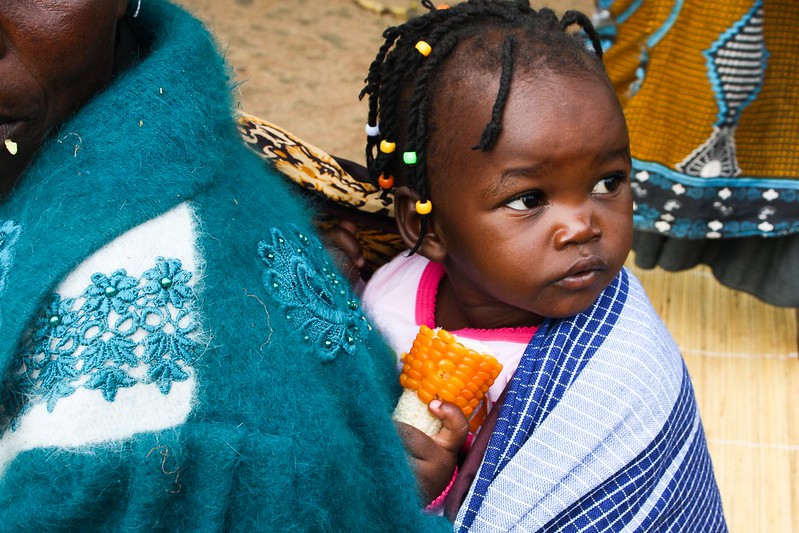How Mary’s Meals Is Reducing Hunger in Zambia
 Zambia, a landlocked nation on a plateau in South-Central Africa, grapples with formidable challenges. Less than 5% of its land is arable, limiting opportunities for agricultural productivity. Consequently, more than one million schoolchildren in Zambia face the harsh reality of attending classes on empty stomachs, depriving a significant portion of the youth population of education.
Zambia, a landlocked nation on a plateau in South-Central Africa, grapples with formidable challenges. Less than 5% of its land is arable, limiting opportunities for agricultural productivity. Consequently, more than one million schoolchildren in Zambia face the harsh reality of attending classes on empty stomachs, depriving a significant portion of the youth population of education.
Zambia continues to struggle with high malnutrition rates, ranking among the world’s highest. Recent reports from 2023 reveal a stark reality. Nearly 48% struggle to meet their daily minimum calorie requirements. At the same time, 35% of children suffer from stunted growth due to malnutrition. Contributing to these distressing figures are inadequate and unhealthy diets, suboptimal feeding practices and a widespread lack of nutritional knowledge.
In response to this urgent humanitarian crisis, Mary made significant strides in alleviating hunger in Zambia. Mary’s Meals originated as Scottish International Relief (SIR), a charitable organization. When Magnus traveled to Malawi in 2002 during a famine and saw a mother who was dying of AIDS, Edward, her oldest kid, stated succinctly, “I want to have enough food to eat and to go to school one day,” in response to Magnus’ question on his life goals.
That incident inspired the establishment of Mary’s Meals, which started in 2002 by providing food for just 200 children in Malawi. Providing essential school meals addresses immediate nutritional needs and offers a vital lifeline to hungry children. Beyond combating hunger, this initiative opens the doors to education, empowering children with the opportunity to learn and thrive.
Mary’s Meals
The Mary’s Meals initiative took root in 2002, sparked by founder Magnus MacFarlane–Barrow’s eye-opening visit to Malawi during a devastating famine. Witnessing the profound impact of hunger firsthand, he was inspired to kickstart the foundation Mary’s Meals, which is committed to ensuring every kid receives a daily meal at school because of the firm belief that every child deserves access to education and sufficient nutrition. After seeing the critical need in Zambia, the nonprofit organization expanded its purpose in 2014 to address the region’s high malnutrition rates, poverty and food insecurity.
The charity began its journey by providing meals to 200 children in Malawi. Since then, it has expanded its reach exponentially, nourishing 2,429,182 children daily across 18 countries. By nourishing young minds and bodies, these meals empower children to focus on their education, fostering a generation capable of lifting themselves. Furthermore, Mary’s Meals envisions sustainable change, aiming for local communities and governments to increase their contributions progressively, amplifying the program’s impact. Through its commitment to reducing hunger, Mary’s Meals ignites a transformative ripple effect that reverberates throughout entire communities, paving the way for a brighter, more prosperous future for all.
Feeding Children
Mary’s Meals significantly impacts and alleviates hunger in Zambia by providing daily meals to 420,896 children across 752 schools. Central to this effort is the involvement of community volunteers who dedicate themselves to serving these meals, underlining the importance of fostering strong community ties for the sustained success of the school feeding program. Mary’s Meals stands out as the primary provider of school meals across all 10 districts in the Eastern Province, an area characterized by limited income stability and inadequate access to food and social support. According to a survey conducted between 2014 and 2019, children in Zambia who benefited from Mary’s Meals were six times less likely to experience hunger at school than their counterparts who did not receive such assistance.
Research and Results
In Zambia, a recent study revealed that after five years of receiving Mary’s Meals, the proportion of children who never fretted about hunger surged by 45%, underscoring the substantial impact of Mary’s Meals in addressing hunger in the region. This has led to a 25% increase in school enrollment rates and a notable decrease in absenteeism. These findings emphasize Mary’s Meals’ tangible and noteworthy effects on children’s well-being. The study affirms the organization’s efficacy in combating hunger in Zambia and its positive influence on children’s nutritional status, vitality and overall welfare.
– Arabella Wood-Collins
Photo: Flickr
